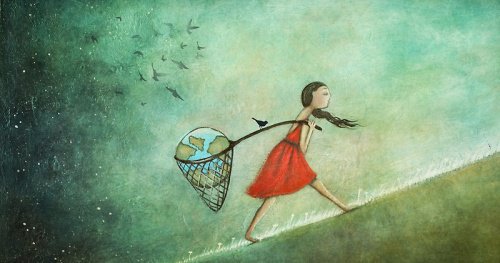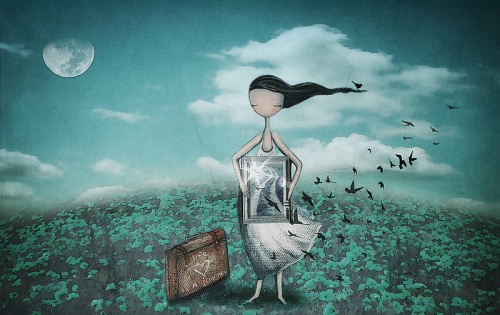Sometimes Crying Isn't A Sign of Weakness


Written and verified by psychologist Valeria Sabater
Sometimes you just get tired. You reach the limits of your strength and you let go. But sometimes crying isn’t a sign of weakness. It doesn’t always mean you’re giving up.
Sometimes there’s nothing to do but just give yourself that release, because you’re tired. You’re tired of being strong. You’re tired of life’s demands, and sometimes the people around you don’t seem to realize how much you give in exchange for so little.
Don’t carry the weight of the world on your back. Only carry what’s truly essential for you. Never forget that your heart needs its own personal space too. Cry even when you don’t need to, because strong people know how to let themselves have these moments.
Crying isn’t a sign of weakness, and you can’t be “strong” every day
Maybe you were brought up with that idea that tears are best “swallowed.” Or that life is tough and crying isn’t good for anything. Over time, this idea can cause very serious emotional problems.
- Not crying can mean that you’re not showing what you feel, you’re hiding behind a mask of being alright.
- If you try to seem normal by covering up your feelings and problems, you’ll be doing more than hiding your emotions from the world, you’ll also be hiding them from yourself.
- Hidden emotions are nothing but problems you refuse to face. A mismanaged emotion can end up manifesting as a headache, migraine, fatigue, muscular tension, dizziness, digestive problems…
You can’t be strong every day, just like you can’t hide your discomfort or sadness your whole life. It’s neither healthy or helpful. You need to give yourself moments of release because your tears can be true stress relievers, releasing pent-up nerves and emotions.
- Sometimes crying can heal you.
- Tears come are a form of release and the first step to change. They mean you’re taking charge of your emotions and letting them out.
- Crying will help you reach a calmer place. You’ll feel more relaxed and better able to see the reality an make decisions.
Read more:

The need to be strong when life asks too much of us
No one knows what it took to get where you are today better than you. No one knows what you’ve had to give up for others, for the people you love.
You’ve done it all for free will because it was what you wanted. You know that perfectly well, but there’s always a time when it seems like life, and even the people around you, don’t treat you with the same appreciation that you’ve given them.
You have to be strong in a society where social and work life can be really hard. But it’s not always easy to show your strength to your parents, siblings, or partner. There are times when these loved ones might prioritize themselves over you.
The truth is that are just some days when you’re fed up with being strong, of carrying everything on your shoulders. In those situations, crying isn’t a sign of weakness, it’s just necessary.
It’s important to set boundaries so that life can’t ask more than you have to offer
No one can give more than they have. It would be impossible to provide happiness and warmth to your loved ones if they didn’t give you attention or love in return.
The key to all this is balance. To be strong and to deal with everything the day brings you, while also fulfilling these goals (and remembering the hardships you have to face) it’s important to keep firm boundaries.
- Being strong means, first and foremost, being happy with yourself. Work on your personal growth, enjoy your alone time, your hobbies, etc. Love everyone alongside you and above all, love yourself.
- The strongest people around are the ones who know how to love other people at the same time as they love themselves. By the way, none of that is selfish.
- Being strong also means getting rid of any weights that drag you down and stop you from moving forward. These things bring down your quality of life and cause you pain. We all know that sometimes it can hurt, but you absolutely have to stop prioritizing people that don’t care about you.
Learn more:

Being strong means allowing yourself to be “weak” every once in a while.
What does that mean?
- You have the right to say you can’t do this or that. It’s perfectly valid to have them look somewhere else so that you don’t take on any more responsibilities than you already have.
- You have the right to say “no more,” that you need to rest.
- You have the right to ask for respect and to demand love, affection, and recognition. People who need something from you need to understand that you also need something from them in return.
Of course, you have the right to your moments of personal catharsis, to finding moments of intimacy where you can take a walk and think about yourself, cry, listen to your thoughts, deal with your emotions, make decisions, and move forward.
Because at the end of the day, that’s just how life is. So, don’t worry, crying isn’t a sign of weakness, it’s a natural part of being a human that will make you stronger. Use it to find a stronger internal balance, and walk your path towards well-being.
All cited sources were thoroughly reviewed by our team to ensure their quality, reliability, currency, and validity. The bibliography of this article was considered reliable and of academic or scientific accuracy.
- Bernardo Stamateas. (2019). Emociones tóxicas: Cómo sanar el daño emocional y ser libres para tener paz interior. Ediciones B. Rústica.
- Sara Laguna, Inés Magán Uceda. (2015). “Un estudio de la importancia de la regulación emocional y del afrontamiento en los episodios de dolor de cabeza”. EduPsykhé: Revista de psicología y psicopedagogía. https://dialnet.unirioja.es/servlet/articulo?codigo=5629528
This text is provided for informational purposes only and does not replace consultation with a professional. If in doubt, consult your specialist.








